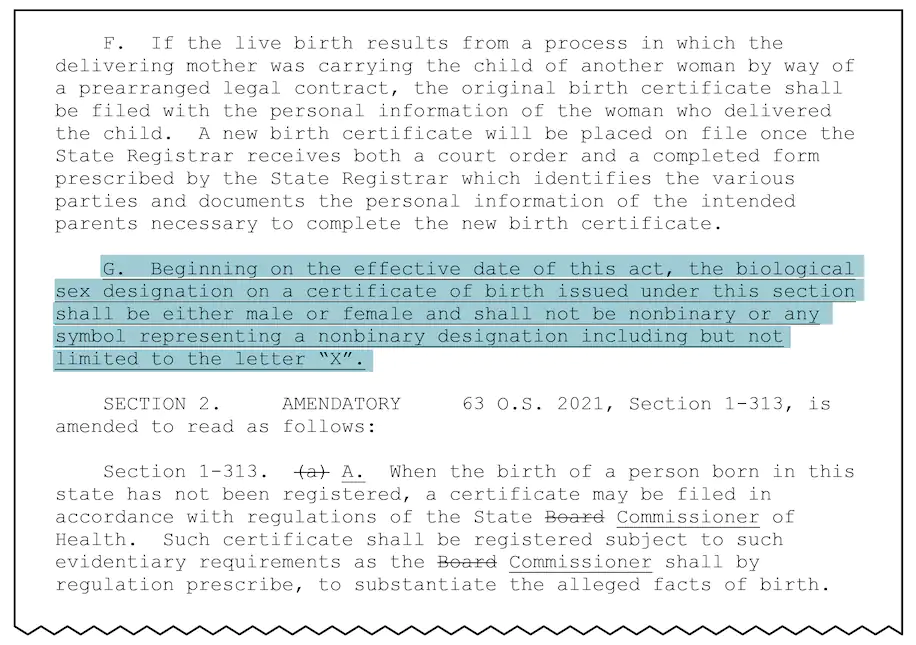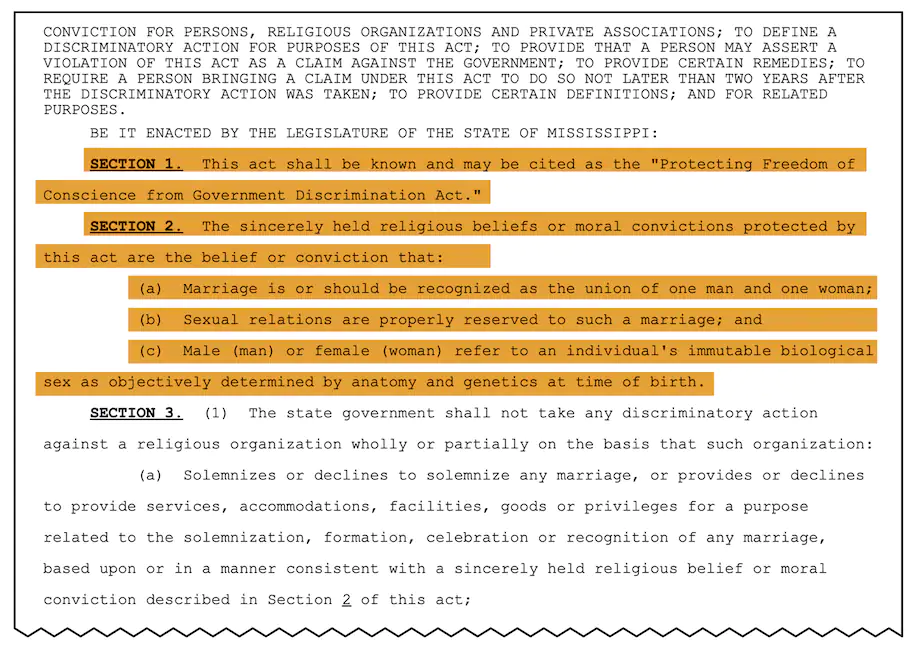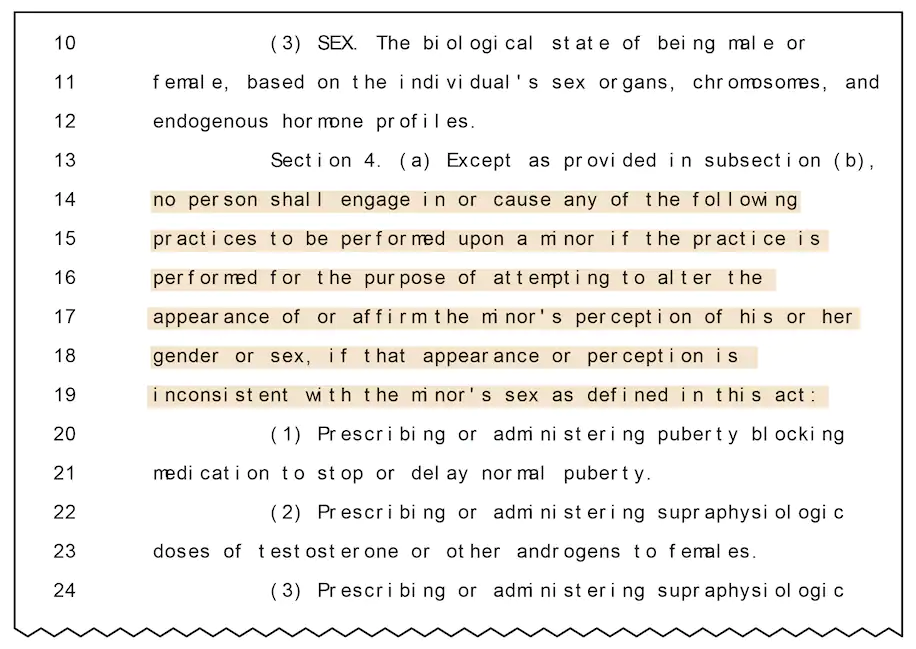Anti-trans laws are on the rise. Here’s a look at where — and what kind.
From bans on gender affirming care to restrictions on names changes, state lawmakers across the country have introduced a slew of anti-trans legislation

For trans Americans, 2022 has been a year filled with terror and uncertainty.
More legislation has been filed to restrict the lives of trans people so far in 2022 than at any other point in the nation’s history, with trans youth being the most frequent target of lawmakers.
There are bills aimed at preventing trans girls and women from playing on female sports teams, laws barring trans youth from using bathrooms and locker rooms that align with their gender identity and restrictions on gender-affirming medical care.
Several governors also have put through their own forms of restrictions.
Earlier this year, Texas Gov. Greg Abbott (R) issued a directive requiring child welfare agents to investigate gender-affirming medical procedures as child abuse — an order that could strip trans children away from their families. Advocates and families are challenging the directive in court and a federal judge partially blocked it. In September, Virginia Gov. Glenn Youngkin (R) unveiled new guidelines that would make it more difficult for trans youth to change their names and pronouns at school, and that prevent them from using school facilities and participating in youth programs that align with their gender identity.
These measures have put the trans community on edge, said Alyssa MacKenzie, an Orlando-based trans advocate.
“I don’t know how to describe to somebody that isn’t going through it how it feels to have the anxiety of waking up every morning, not knowing whether your state is going to attack your right to exist,” said MacKenzie. “To do all of the things that so many people never ever have to question or think about.”
Logan Casey is a senior policy researcher and adviser with the nonpartisan think tank Movement Advancement Project, which has been tracking anti-LGBTQ policies since 2006.
“It’s not just legislation, but also policies that are often made administratively or judicially or otherwise that can shape everybody’s lives, including trans people,” said Casey.
Many states have also increased protections for trans people: passing refuge bills for those seeking medical care in their states, expanding health-care access and adopting nondiscrimination laws.
It is part of a larger pattern: The kind of health care someone can access and education they receive differs drastically depending on where they live. When it comes to trans rights, large portions of the South and Midwest are passing more restrictions, while states on the West Coast and in the Northeast have shored up protections.
How it started
The current wave of legislation seeking to restrict the rights of transgender people began around 2016, with North Carolina’s “bathroom bill” being the most high-profile example from that time. But the pace of legislation began to pick up in 2018. That’s when the American Civil Liberties Union began tracking anti-LGBTQ bills, following an increase in such measures after Donald Trump was elected president, said Gillian Branstetter, a communications strategist at the advocacy group.
In 2018, 19 bills were introduced.
Over the next two years, the number of bills filed slowly increased. But 2021 marked a turning point, when a number of states passed bills restricting trans girls from playing on female sports teams. That year, legislators introduced 131 bills across 34 states.
That number rose again in 2022, with 155 such bills introduced by Oct. 13.
The onslaught of legislation has been driven by conservative legislators who argue that these restrictive laws protect the rights of children and families, rather than curtail them. Others have framed them as a religious prerogative.
Alabama Gov. Kay Ivey (R), upon signing a gender-affirming care ban in the state earlier this year, said: “We’re going to go by how God made us: if the Good Lord made you a boy, you’re a boy, and if he made you a girl, you’re a girl. It’s simple.”
Some have political motives. Dave Carney, a senior adviser for Abbott’s reelection campaign, called restrictions of trans youth “a 75, 80 percent winner” for the Texas governor.
Some legislators are also reacting to the U.S. Supreme Court’s 2020 landmark decision in Bostock v. Clayton County, which found that federal law barring employment discrimination on the basis of sex also applies to sexuality and gender identity.
Conservative lawmakers immediately began looking for ways to undermine the Court’s ruling, said Branstetter, citing Sen. Josh Hawley (R-Mo.), who said it “represents the end of the conservative legal movement.”
These efforts have also been intertwined with the movement to restrict reproductive rights, which share many of the same players, she said, such as the Alliance Defending Freedom, a conservative Christian legal advocacy group at the forefront of fighting abortion rights. An Idaho legislator credited the group with helping write a bill to prevent trans girls from playing on girls’ sports teams. In 2021, it was the first such bill passed in the country.
What kind of laws are being passed
Of the 390 bills introduced in the last four years, only 39 have become law.

Despite the limited success of these bills, advocates say the ones enacted have had a far-reaching effect on the lives of trans people, as has the broader debate over trans rights. The most consequential of these bills include sports, education and ID restrictions, as well as religious exemption laws and health-care bans.
Sports bills: Since Idaho passed its trans youth sports ban in 2021, 18 states have adopted such laws.
Most were specifically written to “protect women in sports,” but some also restrict trans masculine youth from playing on male sports teams as well.
Earlier this year, Utah Gov. Spencer Cox (R) vetoed a sports ban, citing the potential mental health impacts on trans youth, on top of “fundamental flaws” in the legislation. Despite the extensive attention the issue received, there were few trans student-athletes in the state to begin with, he said.
Sports bill. H.B. 11. (Utah state government/Washington Post illustration). Sports bill. H.B. 11. (Utah state government/Washington Post illustration)
“Four kids and only one of them playing girls sports. That’s what this is all about,” Cox wrote in a statement explaining his veto. “Four kids who are just trying to find some friends and feel like they are part of something.”
The state legislature voted to override his veto.
Educational restrictions: Increasingly, K-12 schools have become a central battleground over LGBTQ rights, with lawmakers proposing new restrictions that have a disproportionate impact on trans people.
Among them is Florida’s Parental Rights in Education Law, referred to by its critics as the “don’t say gay” law. The law bars discussion of sexuality and gender from kindergarten through the third grade, and restricts instruction that is not “developmentally” or “age-appropriate” through 12th grade.

Educational restrictions. H.B. 1557, 2022 (Florida state government/Washington Post illustration)
Under the law, parents have broad powers to sue schools or school districts they believe are not complying. It also requires teachers to inform parents if they believe their child is transgender, which could force kids to out themselves to unsupportive families, advocates say.
ID restrictions: Some states have moved to restrict trans and nonbinary people from aligning or correcting identification documents. In a first-of-its kind law passed this year, Oklahoma banned nonbinary gender markers from appearing on birth certificates.

ID restrictions. State bill 1100, 2022 (Oklahoma state government/Washington Post illustration)
Other laws, like one in Tennessee, prevent trans people from changing the gender on their birth certificates, which they may need to get other forms of ID.
Kayla Gore, a Black trans woman who is challenging Tennessee’s law, told the Tennessean in 2019 that having inaccurate identification left her open to “deeply personal and invasive questions” when she applies for new jobs or seeks higher education opportunities.
“Not having documents that fully support who I am, a Black woman, puts me in more danger. It also puts me in situations where my economic status is at risk,” she said.
Religious exemptions: Some states have also passed “religious liberty” laws in recent years, which give people and organizations the right to refuse goods, services or employment to LGBTQ people on religious grounds.
Lawmakers who have supported these bills say they build upon First Amendment protections. But civil rights advocates say these laws empower religious discrimination against LGBTQ people.
Branstetter, of the ACLU, said in practice, these laws allow groups and businesses to deny queer and trans people employment, medical treatments, the ability to adopt children or other services. One 2016 Mississippi law even stipulated which kinds of religious beliefs or “moral convictions” were protected, including that a marriage only should be recognized if it is between a man and a woman, and that gender is determined by someone’s “immutable biological sex.”

Religious exemptions. Mississippi state legislature. House bill 1523, 2016 (Washington Post illustration)
Health-care restrictions: For trans rights supporters, among the most alarming types of laws to gain ground in the last two years are gender-affirming care restrictions for trans youth.
These bills criminalize doctors who provide this highly individualized form of health care, which can include medical interventions such as puberty blockers and hormone therapy. They could also punish parents for supporting their kids as they seek treatment.
Only three states have passed these bans: Arkansas, Alabama and Arizona. As of October 2022, Arkansas and Alabama’s laws were temporarily blocked as they are challenged in court (Arizona’s doesn’t go into effect until next year). States have also pressured hospitals and clinics that provide gender-affirming care to shutter or stop offering those treatments for trans people, both behind the scenes and through legislation threatening to withhold funding.
“Of all the things I’ve done in my life, I’ve never thought getting health care for my kid was going to make me an outlaw,” Jeff Walker, a Birmingham resident whose daughter is trans, told The Washington Post earlier this year.

Health care. State bill 184, 2022 (Alabama state government/Washington Post illustration)
Where trans protections are being strengthened
Trans advocates say it’s important to note that the majority of the anti-LGBTQ bills have not passed. According to Casey of the Movement Advancement Project, despite the surge of restrictions on trans rights in some states, there has also been “a clear growth in protective policies” in others.
Some states, like Connecticut, have created “refuge” laws that protect trans people who come from places where gender-affirming care is banned and are seeking those services in that state. Others, like Colorado, Washington and Hawaii, have passed laws that explicitly require insurance carriers to cover gender-affirming care procedures such as laser hair removal and voice therapy. Still more, like Virginia and New York, have anti-discrimination laws that protect trans people from bias in housing, employment and accessing public services.
But to help ensure their safety, trans advocates say they would like to see their political allies become more vocal in championing trans rights, even in states where protections may not pass.
“If we are going to be a priority for our enemies, we absolutely must be a priority for our friends,” Branstetter said.
Where it’s safe
The onslaught of anti-trans legislation has led families to question where they can be safe.
For Ana, the mom of a trans preteen in Houston, the last year has left her family in a constant state of anxiety and paranoia. (Because of safety concerns, Ana spoke to The Post on the condition only her nickname be used.) Except for her family and a couple school administrators, no one in their community knows Ana’s daughter is trans.
Following Abbott’s child abuse directive, “there’s no guarantee of safety in many regards,” said Ana. “We could be physically unsafe. We could be medically unsafe because we can’t access care. Or we can be psychologically unsafe because we’re mistreated.”
They hired a lawyer and carry a little card with his number everywhere they go. Ana feels at the mercy of everyone her family encounters. Threats are everywhere: Could her daughter’s dentist report her? Her teachers? What if they are traveling and her daughter has an accident that requires medical attention — could she trust those doctors?
They’re set to move to a state on the East Coast next year in hopes of escaping some of their fears. “We were doing risk calculations every day and it was just getting too tiring,” said Ana. “So we decided to move.”
Erin Reed, a trans activist and legislative researcher, has developed tools to help families assess their safety. Reed, who tracks anti-trans bills and court decisions for her 74,000 Twitter followers, recently created a map to help people determine which states are most likely to pass anti-trans legislation.
“I was getting so many questions every day, like, ‘Hey, what about my state? Is my state going in a bad direction or a good direction?’” said Reed. “One of the biggest questions that I’m always asked is, ‘If I move, who’s to say that I won’t face the same issue?’”
The map hasn’t only helped trans people and their families, said Reed.
“It’s [also] for cis people who had no idea [of] the state of anti-trans legislation,” she said. “Seeing how many states are unsafe right now, I feel it is leading people to say: ‘Oh wow, things are worse than I thought they were.’”
But assessing safety isn’t as simple as tracking what LGBTQ-centric policies states are enacting, Casey noted. Other factors — such as a person’s race, immigration status, or proximity to loved ones — must also be considered.
“One of the reasons that the policy landscape is so incredibly important to transgender people and our experiences is because transgender people are remarkably unsafe every day,” said Casey, and that vulnerability has gotten worse in recent years.
(c) The Washington Post 2022



